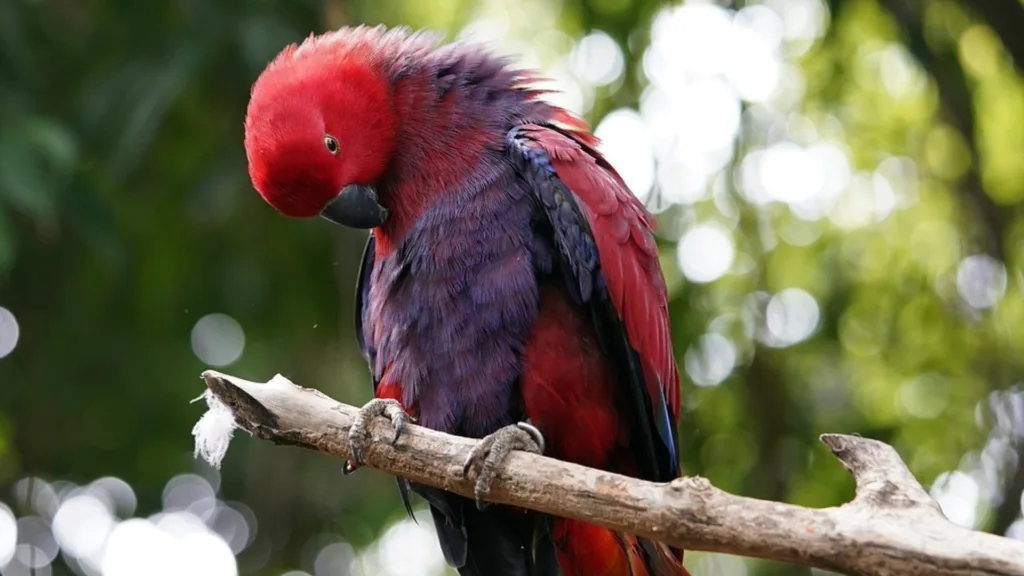Talking or Singing Companion Birds

Living alone can be mentally and emotionally tough at times, especially when your long time partner and closest friends are no longer around. However, companionship that you might love and enjoy can come in many forms and sometimes it can actually come from in the form of a talking or singing bird.
When selecting a feathered friend as a companion pet, it is important to consider the bird’s personality, size, and any special care requirements. If you are on a tight budget, be sure to find out what the typical yearly costs might be for keeping a particular bird happy and healthy.
When you know the exact type of bird you like, shop around and get your hands on a spacious aviary or large cage to keep your new feathered friend in though. I find it to be almost heartbreaking to see large birds being kept in small cages. Purchase a cage or aviary that is large enough for them to fly around in, even if it’s only a small amount of flying that might be achievable.
Finding the perfect talking bird companion for you and your situation will take some time but please be patient with the process. If you are lucky enough to find the exact right talking or singing bird for you, they will provide you with thousands of hours of enjoyable companionship. You will also need a transport cage or container to allow safe and secure transfer from their cage or aviary outside to bring them inside with you.
Once the whole process of your talking or singing coming inside and being taken outside, you and your bird will become quite comfortable with the routine. With your talking or singing bird spending the majority of the day inside with you as a companion, you will feel much less alone.
What are the best talking birds?
The best talking birds include the following; African Grey Parrot, Budgerigar, Amazon Parrot, Quaker Parrot, Australian King Parrot, Cockatiel, Macaw and the Cockatoo.
It’s important to note that every bird is unique and sadly not ever bird will ever learn to talk, although this situation is not common. Regardless of their species and how much time you might spend with them trying to train them to talk, there may be some problem with the part of their brain that enables this.
It’s very difficult to find any one conclusive answer why you could have 2 of the same species in an aviary and one will talk and the other will not. However, there are plenty of articles suggesting that the earlier you start talking to your bird, the earlier they will start trying to mimic you.
What are 3 great choices for singing birds?
Budgies, Canaries and Zebra Finches are all known for their beautiful singing abilities. They can all learn and imitate songs and will keep you entertained once they get going.
Contents of this article. In this article, I’ll provide you with some solid information on (1 ) Canaries, (2) Budgies, (3) Cockatiels and (4) African Grey Parrots.
No (1). Canaries.
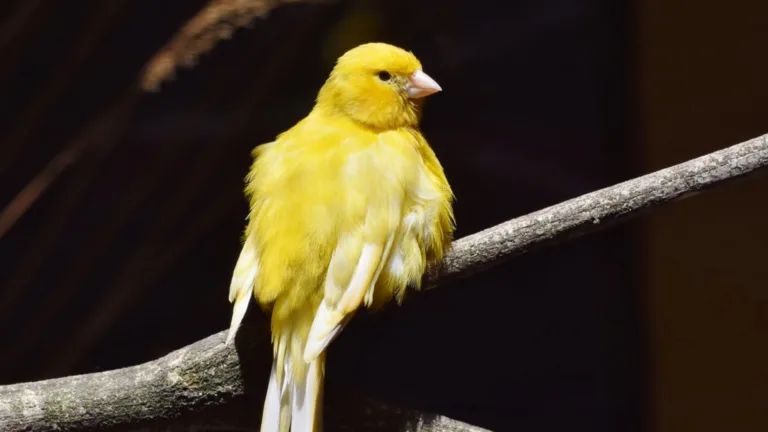
Canaries may not be talkers, but they are excellent singers. Canaries are adorable and will enjoy singing to you. Canaries are vibrant little birds that are beautiful and well-known throughout the world for their soothing, calming songs. Canaries are not only small and easy to care for, but they are also entertaining to watch and do not require much attention from you, which is ideal if you have slightly limited mobility at this stage of the game.
Canaries make great companions whether you live at home, in a retirement community, or in an assisted living facility. Canaries are perhaps the most well-known singing birds because they are inexpensive and available in almost every pet store. Canaries are well-known for whistling a variety of tunes and belting out some great songs (to varying degrees), as well as mimicking the sounds of other birds.
Personally, I would prefer to buy a male Canary. The reason for this is that in the wild, male Canaries sing the most in order to attract a mate or establish territory. Canaries will also mimic noises that they hear them on the radio, TV, or just around the house, and you may be caught off guard wondering where a particular noise is coming from, only to discover it’s just your canary having a good time.
Canaries live for an average of 10-15 years. Canaries have been known to live up to 18-20 years with proper care and some luck.
Here are my tips to keep your canary happy and healthy and hopefully get him/her to live as long as possible:
Make sure your canary has a large cage. Canaries like to fly around, so a large and especially wide cage is essential. The cage should be at least 60cm tall and 80cm wide for one canary. These small cages that you might see a canary kept in on TV shows and in some movies are, in my opinion, cruel.
Set up perches in the cage. Purchase natural wood perches (not treated wood) of varying diameters to spice up your canary’s experience. Place the perches on the cage’s sides, across from one another. Swings are also popular with some canaries.
Every day, clean your canary’s cage. Although it might be a small hassle, please be sure to clean the cage ever day. Replace the paper that lines the cage’s bottom, wash the food bowls and drinking water dish and the dish for their bathing. Once per week you should wash the entire cage with soap and water. You can also purchase a specialty bird cage disinfectant that you can wipe over it as well.
It is critical to provide fresh water for your canary. Canaries, in fact, can die after only 24 hours without water. You should keep a large drinking water dish in the cage and refill it on a regular basis throughout the day. It doesn’t take more than a couple of minutes and tap water should be fine for your canary. However, if you know your local tap water quality is rubbish, use bottled water; the cheapest bottled water in the supermarket will suffice.
Give your canary a well-rounded mix of food. A diet rich in seeds, fresh fruits and vegetables and occasionally mealworms is required. A good source of protein is necessary for canaries overall health and strength.
Provide entertainment options. Canaries don’t require a huge amount of toys for them to be happy. One or 2 toys and a swing in the cage can help keep your canary entertained. Canaries are less interested in toys than other birds and that don’t need mirrors, I’m not sure where that rumour ever came from. It’s not as though you can’t buy them a mirror, you certainly can but I know sometimes males don’t like them. Typically, when you do put a mirror in the cage with your canary, the thinking is that they will think the reflection in a mirror represents another canary and that the canary in the mirror will keep your bird company. If the mirror does end up working with your canary, it’s possible for them to communicate to the other bird in the mirror. The males, might, however, sometimes take offence at what they see in the mirror. They may see the canary in the mirror as a threat to their food and personal space and could become anxious and irritated due to the intrusion. So if you do put a mirror in the cage with a Male Canary, just monitor the situation and obviously remove the mirror if you notice and changes in behaviour.
Provide a bathtub for your canary to bathe in. Your canary should be given the ability to care for itself. All you need to do is provide a shallow water dish for it to bathe in.
As needed, trim your canary’s nails. Canaries’ nails normally wear down naturally as they perch and move around their cage, so they don’t usually need to be trimmed very often. If you provide them with a nice big cage with plenty of perches and space to move around in, you might not ever find yourself trimming your canary’s nails. Once or twice a year, take your canary to the veterinarian. Frequent examinations can aid in the early detection of any health problems.
No.2 Budgies/Parakeets.
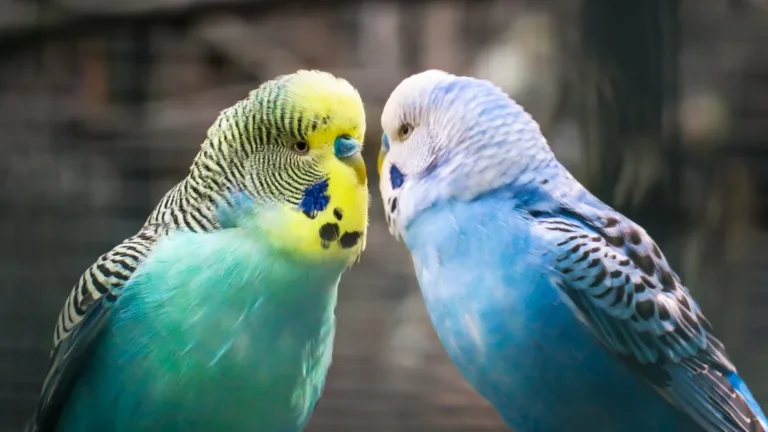
Budgies (Parakeets) are truly extraordinary pets, and I’ve written a Blog article about them on my other website, ‘My Pet Support’ and here is the link. I make no secret that I think budgies are exceptional. These small, colourful, and frequently very attractive parrot species have a lot of personality for their size. Budgies will leave an impression on you, and it is due to their exceptional qualities that they are among the most popular small bird species kept as pets around the world.
Budgies are quite social and require more social attention from you than other birds, but that’s fine because spending time with them and having them around to keep you company is the whole point. A fascinating fact about budgies is that they can be trained to be reasonably skilled talkers as well.
Feed your budgie properly: Budgies love eating vegetables, fruits, nuts, wild bird seed mix. Put your budgie’s food in metal bowls instead of plastic ones as plastic ones tend to collect bacteria more easily than a metal one will.
Clean out the budgie’s cage at least once a week. A daily cage clean is probably better if you can manage it and this will keep your budgie happy and safe from disease germs.
Create a good environment for your budgie to sleep. Budgies are active birds that require approximately 8 hours of sleep per day (just like us). They will often sleep in short bursts throughout the day and night but a little longer at night which is natural for them. Budgies will occasionally sleep for 30 minutes at a time during the day and they will tend to nap after being active or eating during the day. Budgies love a good sleep at night, usually in 3 hour blocks and this keeps them healthy.
It’s crucial that you create a cosy and secure sleeping space for your Budgie in order to guarantee that it gets enough sleep. Give your budgie a quiet, dark place to sleep and you can achieve this via a sleep tent or a cover for their cage. Give your budgie a variety of perches so they can sleep in different positions in addition to a soft, cosy perch that will be their main sleeping perch.
Limit their exposure to noise and any activity that might prevent them from sleeping during the night. When it’s time for your budgie to sleep, put them in a room that has the most stable temperature throughout the day and night. Every home I’ve even lived in normally has a ‘Goldilocks Room,’ which is a room that is neither too hot nor too cold.
Monitor your budgie’s health; take notes on how your budgie is when he or she is healthy so you don’t have to rely on memory later if you suspect your budgie is not doing well. Making those notes earlier allows you to compare how your budgie is now to when you knew he or she was healthy. Obviously, if you suspect your budgie is ill, please take him/her to your veterinarian as soon as possible.
No (3). Cockatiels.
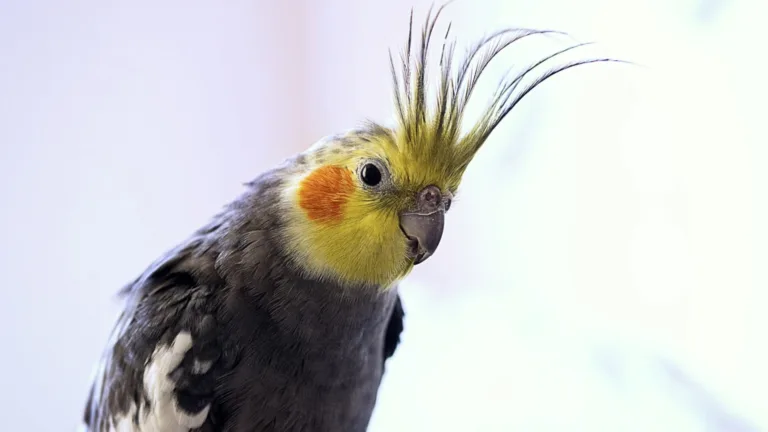
Cockatiels are another bird I’ve written about on my other website (My Pet Support) and are possibly the most commonly kept type of parrot on the east coast of Australia that I can think of. Here is the link to the article I about Cockatiels on the My Pet Support website, it’s called, ‘Keeping a Cockatiel as a Pet’.
Cockatiels are native to Australia and are well known for their distinctive crests and their ability to mimic sounds and whistles.
Cockatiels are probably so popular due to them being so playful, affectionate and social in nature. They are relatively easy to care for and can be trained to perform tricks which can be very funny to watch at times. Cockatiels are also well known for their longevity and some Cockatiels and live up to 30, which is a very decent innings.
Cockatiels can be annoyingly noisy at times but there are ways to manage these situations. A lot of the time Cockatiels are being noisy is because they are trying to let you know about something. It might be that they are hungry, in need of attention as there could be something annoying them like other birds climbing around on the side of their aviary that they do not appreciate.
Cockatiels might make some noise if they are bored too. To avoid your Cockatiel becoming bored, give them plenty of bells and ladders to destroy, yep they tend to chew everything, they love toys and ladders but this does not stop them from annihilating them.
Cockatiels, just like most other parrots, will be at their noisiest in the morning and late afternoon and I’m pretty sure this is standard for colony birds.
Cockatiels will enjoy spending time with you once you figure out a safe way to transport them in and out of the house and into their aviary or large cage.
Cockatiels have an incredible ability to mimic common sounds they encounter, such as your dogs, common noises in the home, as well as words or small phrases you repeat around them.
No (4). African Grey Parrots.
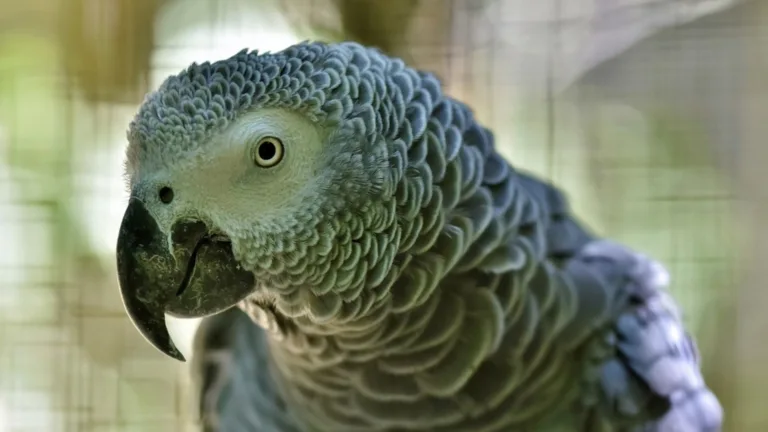
African Grey Parrots are highly intelligent birds that are often regarded as the best talking bird species you will ever take home with you. African Grey Parrots can develop huge vocabularies of hundreds of words and once they have warmed up to you and feel comfortable, they will hard ever shut up. Possibly the only downside of an African Grey Parrots is their cost, they can be quite expensive. African Grey Parrots also require a lot attention from you and they require the correct level of health care.
African Grey Parrots are highly sought after as pets because of their intelligence, affectionate nature, and ability to mimic human speech. They are known to be the most intelligent of all parrot species and can learn hundreds of words and phrases with the right training. These birds are also very social and demand interaction, making them great companions for people who are lonely. However, it is important to note that African Grey Parrots require a lot of attention and care, and they can be noisy. African Grey Parrots need lots of mental stimulation to keep them happy and healthy. If you are considering getting an African Grey Parrot as a pet, make sure you are prepared to meet their special care requirements
Here are some tips to ensure your African Grey Parrot is happy and healthy:
Provide a suitably sized cage or aviary and set it up correctly. African grey parrots need a spacious home that is at least Width 91cm x Depth 56cm x Height 167cm. The extra wide Watson & Williams Bird Flight Cage on wheels is a great choice and in Australia, these are available from Petbarn.
It would be much more preferable to get a cage bigger than this or purchase an aviary. If you are on a budget, check out a few of the garage sales on Saturday mornings, lawn sales for those in WA.
As African Grey Parrots require a lot of attention and stimulation to be happy be sure to position your cage or aviary at a location that will make them happy.
Position the cage or aviary you purchases for your African Grey Parrot in a location that will keep them warm and dry and protected from direct sunlight. You may need to either put the cage or aviary you’ve purchased for your African Grey Parrot under a permanent shade structure such as your covered entertaining area. Alternatively you could purchase structure or shade cloth with eyelets that you could get someone to put up for you to cover the cage or aviary.
Be sure to set up the cage or aviary you purchase for your African Grey Parrot with plenty of perches of different sizes and thicknesses to keep their feet strong and healthy. Also be sure to put plenty of toys in the cage or aviary you purchase for your African Grey Parrot as they love to be mentally stimulated. The toys you might consider for your African Grey Parrot would include bells, rope swings, climbing frames, ladders and mirrors to keep them happy.
Be very particular about the dietary needs for your African Grey Parrots. They need a diet that consists of pellets, fruits, vegetables, seeds, nuts, and grains. Do not feed them foods that are high in fat or sugar.
African Grey Parrots need plenty of exercise and mental stimulation to be happy and healthy. The sooner you can get your routine for transferring them in and out of the house, the better. African grey parrots around 3 hours of exercise per da and they will get this much needed exercise when they are out of the cage more than they will in their cage or aviary.
African grey parrots are social birds and they will benefit from any personal time that you set aside with them. This is one on one time where you play with them, give them plenty of attention, let them climb all over you and just socially interact with them. They can become sad and distressed if you ignore them or leave them alone for too long.
You will need to take your African Grey Parrot to the Vet every 6 or so months. They require vaccination from Polyomavirus, need intestinal worm treatments that only a vet can administer and checked for bacterial and fungal infections.. Taking your African Grey Parrot to the Vet twice a year will help make sure any health problems are either prevented or at least detected very early.






